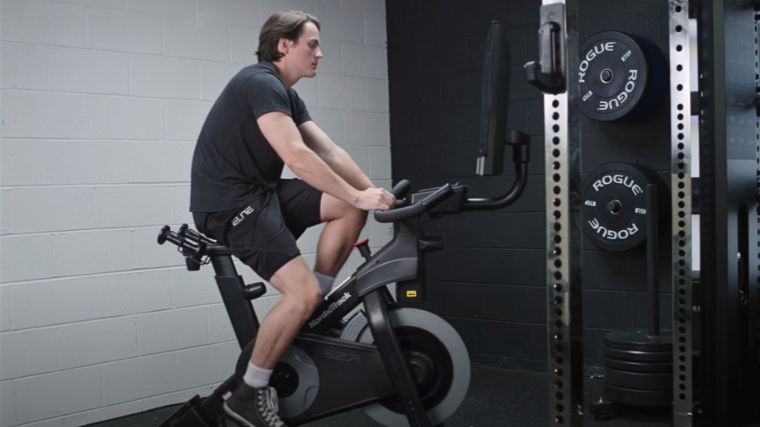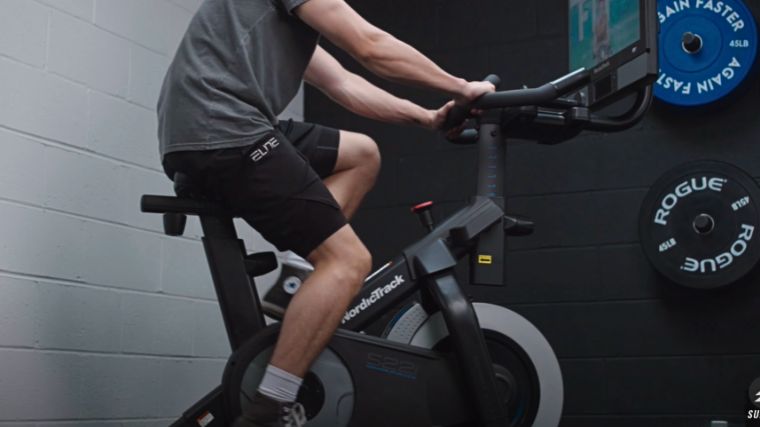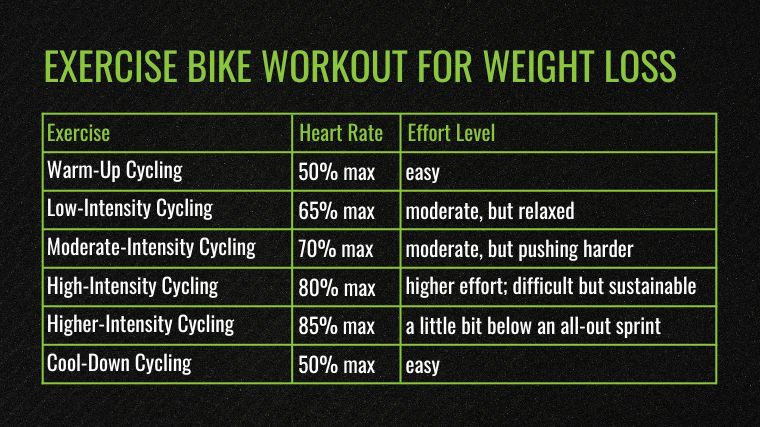Body composition is often top of mind for new gymgoers and weight room veterans alike. One of the most encouraging parts of starting (or continuing) a training program is the slow reveal of new muscle. In this case, an exercise bike is a fantastic tool for fat loss.
Integrating a consistent cardiovascular portion of your training program can be a big factor in creating the calorie deficit needed for weight management programs. But with a wide variety of tools to help meet your fitness goals, are exercise bikes good for weight loss? Here’s what you need to know about exercise bikes if weight loss is a goal of yours.

Editor’s Note: The content on BarBend is meant to be informative in nature, but it should not be taken as medical advice. When starting a new training regimen and/or diet, it is always a good idea to consult with a trusted medical professional. We are not a medical resource. The opinions and articles on this site are not intended for use as diagnosis, prevention, and/or treatment of health problems. They are not substitutes for consulting a qualified medical professional.
How to Use Exercise Bikes for Weight Loss
An exercise bike helps you burn fat and manage body weight primarily through energy balance. Your goal is to create a moderate (and sustainable) daily calorie deficit. The exercise bike is valuable in many ways, from low intensity for beginners, to moderate intensity and duration, or high-intensity interval training (HIIT).
Research suggests that aerobic training can help drive weight loss, making the exercise bike a solid option here. (1)
Low-Intensity Steady State
Low-intensity steady state (LISS) cardio is when you select a sustainable pace that you can maintain for a solid length of time without resting. This should challenge your heart rate to around 50 to 65 percent of your max heart rate. The idea is that it elevates your heart rate above your resting rate but isn’t nearly as challenging as, say, high-intensity intervals.
The aim is to maintain your heart rate at this pace for the duration of a workout, often lasting anywhere from 15 minutes to an hour. LISS bicycle workouts start essentially as an extended warm-up for some but overall are much more of a casual experience. Their lower intensity is also extremely beneficial as they can be less fatiguing.
[Read More: The 6 Benefits of Exercise Bikes (Plus Workouts From a Personal Trainer)]
Moderate-Intensity Steady-State
Moderate-intensity steady-state workouts are the bigger sibling of LISS cardio. Both styles park you on your exercise bike for an extended period, but moderate intensity cranks your pace significantly and ends your workout likely within about 30 minutes. The increased pace makes it much harder to cycle for longer durations but also helps improve aerobic performance.
[Read More: The 7 Best Budget Exercise Bikes]
When compared to LISS workouts, you would expect to burn more calories in the same amount of time. However, the increased intensity (sitting around 65 to 80 percent of your max heart rate) means there is also a bit more recovery cost. This workout feels much more like a standalone training session than the low-intensity counterpart. You’ll have to consider if these workouts are sustainable for you.
High-Intensity Interval Training
High-intensity interval training (HIIT) is the most vigorous version of an exercise bike workout. Some might prefer it since the workouts require much less time, but they are certainly the most challenging in an immediate sense. Although all workouts are scalable based on your fitness level, HIIT workouts need to be strategically placed in your program to accommodate for added recovery time.

[Read More: The 8 Best Magnetic Exercise Bikes]
High-intensity interval training structures short intense bursts of activity paired with rest times to create rapid spikes in your heart rate. There are many categories of HIIT, from structured work-to-rest ratios to less structured sprint interval training. In any case, HIIT uses higher-intensity bursts to maximize your aerobic and anaerobic gains in the least amount of time possible.
Benefits of Exercise Bikes
Exercise bikes offer a ton of health benefits, programming options, and convenience for your fitness goals. From a casual cruise to cranking the resistance and hitting up some HIIT, the stationary bike was made for you.
Cardiovascular Health
An exercise bike can play a crucial role in any health and fitness-related goal. Hitting the gym doesn’t exclusively mean striding into the weight room and taking advantage of the coolest cable machines and barbells. Sometimes you’re looking to improve your aerobic health, burn calories, or help stay on top of metrics like your blood pressure.
Aerobic exercise more broadly is great to help with all of these fitness goals. It is beneficial for managing your blood pressure and other cardiovascular health indicators. (2) The stationary bicycle happens to be one of your most convenient and low barriers to entry choices here.
Programming Options
Most training plans have many moving parts. From balancing strength training, aerobic fitness, and muscle hypertrophy goals, blending everything together smoothly can be a real challenge. The exercise bike is one of the easiest ways to work your aerobic goals into any program.
The exercise bike is low impact, meaning that regardless of intensity, it often leaves you less sore or fatigued than a higher-impact treadmill workout. Given how easy to use and how broad-ranging the training options are, your exercise bike workouts are easily woven wherever you may need them.
[Read More: The 8 Best Exercise Bikes with Screens]
As an extended warm-up, standalone workout, or a cap to a strength training day, the exercise bike is extremely flexible to your needs.
Convenience
Exercise bikes are everywhere. Between the boom in the last several years of home gym equipment to the rows upon rows of stationary bikes found in commercial gyms, it’s easy to find one for your workout program.
[Read More: Recumbent Bikes Vs. Upright Bikes — Which Is Best for Your Goals?]
But a bike doesn’t have to be stationary. An excellent way to enhance your aerobic experience is to take your cardio workout on the road. Outdoor cycling (either as a commute or on a nature path) is another extremely convenient option. Try cycling to the gym for your next workout as a time-efficient way to knock out your cardio.
Exercise Bike Workout for Weight Loss
If weight loss is top of mind, you have a ton of great options to choose from. Anything from low-intensity steady state to high-intensity interval training helps, but a nice middle ground is moderate-intensity threshold training. Here’s how to do it.

- 5-10 minute dynamic warm-up cycling at approximately 50% heart rate max (easy)
- 15 minutes cycling at approximately 65% heart rate max (moderate, but relaxed)
- 5 minutes cycling at approximately 70% heart rate max (moderate, but pushing harder)
- 5 minutes cycling at approximately 80% heart rate max (higher effort; difficult but sustainable)
- 5 minutes cycling at approximately 85% heart rate max (a little bit below an all-out sprint)
- 5-10 minute cool-down cycling at approximately 50% heart rate max (easy)
The goal is to slowly creep toward a pace that you cannot sustain for long without slowing down, right at the end of your workout. Using approximate heart rate max targets is great, but going by feel is another place to start. Your mission is to last anywhere from 20 to 30 minutes for the workout portion, emptying your proverbial gas tank by the end.
[Read More: Demystifying Your Fat-Burning Heart Rate Zone]
Coach’s Tip: Start easier than you think you need. This workout is simple to scale up and great for aerobic performance or weight loss.
How Often to Do This Workout: This workout fits nicely into most resistance training or combined resistance and aerobic programs. Try using it twice per week to start.
Modifications
- Make It Easier: Cruise for your 15-minute ride at 60 percent of your max heart rate instead of 65 percent.
- Make It Harder: Start your higher intensity waves at 75 percent of your max heart rate instead of 70 percent.
Cycling Toward Weight Loss
The exercise bike is a fairly universal staple in any gym. From stationary bikes in your home, the big box gym down the street, or even outdoor cycling, exercise bikes are everywhere. You would be hard-pressed to find a more adaptable, convenient, and effective tool for your weight loss goals.
[Read More: The 9 Best Exercise Bikes For Heavy People]
This cardio machine weaves seamlessly into nearly any program and delivers a fantastic boost to your calorie-burning needs. Between a steady diet of nutritious foods and consistent cardio and strength training, an exercise bike is a fantastic tool for your weight loss goals.
FAQs
The exercise bike is one of the most common pieces of equipment in any gym. Here are some frequently asked questions about the exercise bike and weight loss.
Exercise bikes are great options for designing a program around losing belly fat. Keep in mind, however, that weight loss in general requires a sustainable calorie deficit. This means burning more calories per day than you consume. Aerobic exercise (for example, on the exercise bike) helps you generate the calorie deficit you need to tip the energy scales towards weight loss.
Your belly is a common “storage spot” for your body fat. Spot reduction (or targeting your belly specifically) is not a reliable outcome; however, you can burn body fat from your entire body — including the belly.
The intensity of your workout usually dictates the length of your stationary bicycle sessions. To lose weight, you want to create a calorie deficit (burn more calories than you’ve consumed). The stationary bicycle contributes to this equation by helping to burn those calories with much greater focus.
The intensity of your ride means a longer or shorter workout. Lower-intensity work usually burns calories at a slower pace, whereas moderate to higher-intensity sessions burn them faster. Low-, moderate-, or high-intensity rides are all beneficial, but a good rule of thumb is around 15 to 20 minutes per session to start.
Training every day in general adds up over time. At some stage, you’ll want to pepper in complete days off for rest, as your performance on any exercise style (strength or aerobic) is best when you’re fully recovered.
With that in mind, the exercise bike is low-impact and very easy to recover from compared to high-impact cardiovascular training options. While you still won’t want to train every single day, the exercise bike certainly helps with higher-frequency programs.
References
- Donnelly, J. E., Honas, J. J., Smith, B. K., Mayo, M. S., Gibson, C. A., Sullivan, D. K., Lee, J., Herrmann, S. D., Lambourne, K., & Washburn, R. A. (2013). Aerobic exercise alone results in clinically significant weight loss for men and women: midwest exercise trial 2. Obesity (Silver Spring, Md.), 21(3), E219–E228.
- Dimeo, F., Pagonas, N., Seibert, F., Arndt, R., Zidek, W., & Westhoff, T. H. (2012). Aerobic exercise reduces blood pressure in resistant hypertension. Hypertension (Dallas, Tex. : 1979), 60(3), 653–658.
The post Are Exercise Bikes Good For Weight Loss? (+ Workout From a Personal Trainer) appeared first on BarBend.

